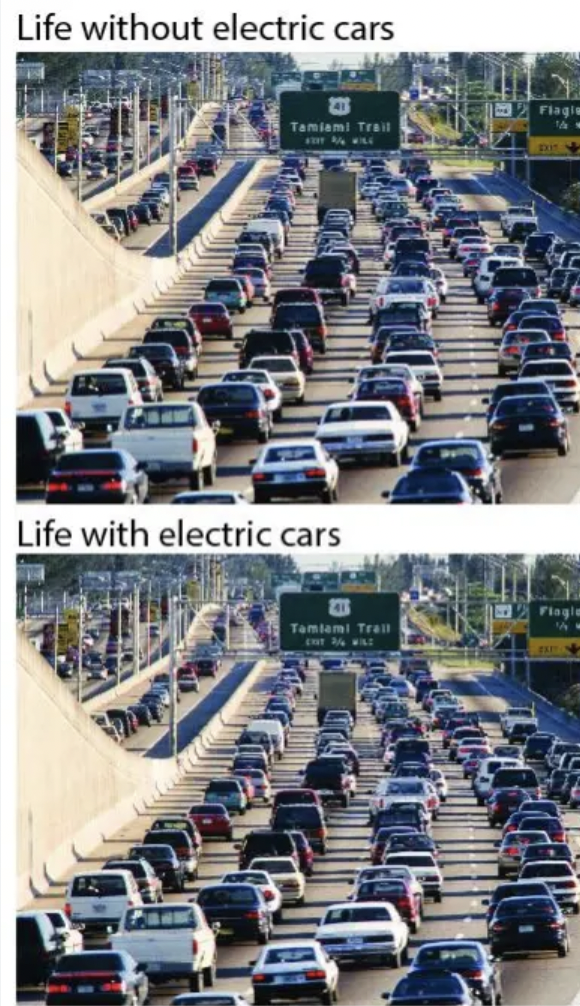The Government has provided subsidises for electric vehicles so New Zealand can urgently adapt to climate change. This is a carrot approach. A risk for providing a subsidy is that the producer or retailer simply raises their price to absorb the subsidy and the consumer gets no real benefit. Radio NZ article, 28 November, ‘Motor industry predicts used car prices will rise up to 25% under Clean Car Standard’ quotes ‘industry’ as saying ‘but price rises in Japan had soaked up consumer rebates so customers [in NZ] were not much better off’. A price is relative to what somebody is prepared to pay. If a firms knows customers were paying at a previous price; then a government rebate just means the firm can increase the base price of their product by the value of the rebate then they know the customer can pay the higher price because they could before. We can’t say this is what has happened here (yeah right).
But there is a deeper problem, the whole article content contributed by the interviewed people is to warn government to lay off change; its’ going too fast, not enough support, problems, and its going to drive up prices, wow 25%. And the warning acts as a signal to each other that price rises are expected and possible; it can drive inflation to make profit. In doing this the used car industry is actually showing that the private market is not able to adapt quickly to the need to minimise climate change. Private enterprise in this market is actually holding back necessary and urgent adaptation.
The governments carrot and stick approaches are failing to bring about critical economic and environmental change because private enterprise can’t adapt. The best option now is for the government to approach overseas producers directly with an option for a large one off import of EV’s. Overseas producers can tender. The best tender presumably based on the longest range and battery durability rather than a high sport performance (which so many EV producers seem to be going for)! Means a large influx of EV’s is possible. Government can sell them at the cost to get them here (no middle man profit cost for customers to pay) and we get a major transformation of our transport system. If the tender contract was big enough. It could be very cost effective for an overseas producer, one model, one standard, no bells and whistles (like radios) as they can be put in later. Or whatever to keep the cost down.
According to google New Zealand Motor Vehicle sales (for new cars) average 93,713 units a year. And 130,317 used cars were imported into New Zealand during 2021. So if a 100,000 new EV’s were imported you could definitely soak up a huge amount of that demand as the price would be low. And a lower price is likely to bring new people into purchasing an EV. A kick back for government could be trade in’s with the vehicles sold as scrap back overseas, or jobs in recycling.
Risks:
- Car yards go out of business…. Is that a problem or a benefit? Not a huge impact for used car as they are so much cheaper. Many new vehicle sales are luxury vehicles so the impact may not be catastrophic on the new vehicle market. It is possible the government imports could bring down inflation as firms lower prices to sell stock to stay in business.
- EV’s don’t sell; I don’t believe it at the moment. There is a huge amount of EV interest.
- Financial risk to government – Yes, but not this early in the market. Risk could be removed by preventing private car sales of this particular model. So no price undercutting on the one competition item and ramping up prices on all the others. But at the worst if sales did not happen then vehicles could be sold/rented/leased to the poor so they could get to work and have a life.
- People hate the design looks of the EV and won’t buy it. People bought Skoda’s, Hillman Imp’s… people need transport. And we are long way off great public transport; but this won’t stop that progress.





Tell the poor to walk! Everyone else get a EV with government assistance! Vote Labour! Vote Green! and if you can afford it, buy a pair of good shoes.
Yes agree RB the very people who need assistance once again ignored by the Labour Government and their loyal propagandists.
Heh. Another day, another Central Government Five Year Plan (starting with one year). Meantime in Europe the egg discovers the chicken:
Volkswagen says EV battery plants in Europe may ‘practically unviable’ due to energy costs in region
Chuckle.
ie production could be affected by energy crisis…nowt to do with the viability of actual EVs…nice try tom but no cigar.
The only way EV’s will be viable is when the public are coerced into public transport at the expense of private transport. There is not enough natural resources on this earth to power the current UK vehicle fleet, let alone the rest of the world. Something will have to give, and that something is our very own private vehicle ownership.
The obvious point to take away from Volkswagen’s comment is that if renewable energy actually worked, let alone was as cheap as its backers claim, then they’d have enough energy to make these EV batteries.
Hence my chicken-and-egg comment; renewables like wind and solar cannot support themselves – and not just in Europe but everywhere.
I guess the worst outcome is the design isn’t suitable to the majority and/or NZ road conditions, that would hamper uptake – even as rentals among the desperate.
It all depends on the price. if you visit south or west Auckland car yards, they meet the demo-graphical market they serve with cars valued between $5K to $20K. Usually Japanese imports. It is what people can afford.
They are also heavily stocked with people movers (7 seaters) as families are larger (extended with grand parents and grand children).
Until EV’s hit this demo-graphical need. They wont find a way into the west or south Auckland market (or any poorer area of New Zealand).
So where will the state find a ready supplier off people moving EV’s valued at around $20K?
I suspect your scheme will be supported widely by the rich (as is the current scheme) not so much by the middle classes and even less so for the poor.
The trickle down of used Nissan Leafs do not cut the mustard. Too small and in used condition restricted in range for what the poor use the car for. Nor will home charging be of any use where a crowded housing situation (very common for the poor) may have three or four vehicles to charge. Blow a few fuses?
Great socialist idea but no soup. It simply will not meet the market for the poor.
Wait till the road user charges start being applied and the cost to monitor and collect are added. Another huge kettle of fish.
This is an interesting idea although it would be lots cheaper to have the radio fitted in the factory than getting them installed here.
More madness from Labour
We shouldn’t be letting any EVs into the country until we have the renewable generating capacity to power them. Every EV that goes on the road forces us to shovel more coal into Huntly power station.
RUBBISH. Justify that convenient ingnornant POV.
Most EV are powered from their owners owner solar cells on their own roof. See NZ EV organisation.
EV are easily charged overnight when electricity use is LOWEST and thus does NOT need coal power.
This comes across as paid for opinions via the Koch brother monies/propaganda.
Wake up people. EV’s aren’t the solution, but they DO buy us a LOT more time to be selfish and drive personal vehicles rather than do what NEEDS to happen, which is public transport.
In order to charge an EV off solar panels the owner would need about half a square kilometer of panels and then they’d only charge in the day when you’re out, if it wasn’t overcast.
In NZ the ‘capacity factor’ for solar panels is only 14%, meaning they only deliver on average 14% of what their nameplate says. This is because of our high latitude and ‘long white cloud’. By comparison my friend’s new Tesla uses so much power to charge it, he had to get his house rewired to handle the additional load!
Your comment about charging at night is quite a common misunderstanding: The problem isn’t instantaneous load on the grid which would indeed he assisted by charging at night, it’s the total annual MWH capacity of our generators. We are only about 82% renewable in this country most of which is hydro and geothermal, with the rest having to come from fossil fuels. So, any additional demand placed on the grid has to come from fossil fuels. This is why coal consumption at Huntly is shooting up.
If the government was both green AND technically literate, they would be first focusing their efforts on adding renewable generating capacity to the grid before electrifying the fleet. Once we were 100% renewable, we could begin serious electrification.
We will need more than twice the current power generation capacity in order to electrify our entire vehicle fleet and a new grid to transmit it. Think about that for a minute and tell me how that is going to be achieved (hint: Wind & solar cannot do it)
I can not understand where you get your supposed facts.
I’ve had an EV for 5+ years and 90+% of the time I charge from my solar panels and in winter it’s done at night at half rate because there is such low demand for electricity, according to the electricity business that make a profit from selling ‘it’.
So I don’t even know where to start with your reply.
The Tesla chap ONLY needs to rewire for two probable reasons.
1) His house wiring is too old
2) He wants to charge at MAXIMUM ampage rather than the most cost effective and most sensible rate.
Differentiate between NEED to and WANT to.
His house is less than 5 years old, and he needed a 3phase supply to charge his $150,000+ Tesla SUV.
On the one had you say you charge your car with the panels on your property, then you say you charge your car at night. Hmmm. Really.
What total rubbish! You don’t need half a square km to charge an EV, this is so far outside reality I’m astonished you’d write something so patently false.
Fossil fuels in NZ are typically for peaking loads, which on average are not at night and due either to cold snaps or extreme industrial load at times when hydro lakes are low.
The use of fossil peaks is entirely because our power market is so totally broken we effectively incentivise pollution as it’s profitable for gentailers to do so (last, most expensive capacity sets the wholesale price so incentivises it’s use).
This more than anything is why we have lagged in that last 15% of capacity – gentailers have been raking abnormal profits from this rort and don’t want to build renewables as they are but far the lowest cost generation.
People with solar panels often have a storage battery, your mate probable wanted to fast charge his Tesla which requires a larger power supply, I don’t know where your 14% number comes from, since they are called solar panels they will only be about 50 % producing due to the lack of sunshine at night, cloudy days, rain & early morning /evening also reduce production. My panels make over 7 Kw when the sun is shining so they make a good reduction in the power bill. Maybe if you had not over indulged in fuel when younger your comment would be correct.
The 14% is an annual figure so includes not just night vs. day but cloudy/rainy days and seasonal variations in daylight hours. Wind has similar problems which is why – globally – they do about 30% of their nameplate capacity, only hitting 100% sometimes. Surely this is not hard to understand?
Here’s a classic recent example from Britain. That graph of solar power output – far short of its nameplate capacity – is entirely typical:
hey could have built some 154 times as many solar panels as they currently have. With that, they could have obtained the exact amount of electricity that they actually consumed today. However, it still would have come mostly at mid-day when it was not needed, and nothing during the peak 6-8 AM and 5-8 PM windows. To cover those, you would need some kind of energy storage. Hundreds of gigawatt hours worth, just for today. Or you could try saving the energy up from the summer time when there is more sun. But for that, to cover the whole winter, you would need, for just the UK, some tens of thousands of gigawatt hours of storage, of a form that could store the energy for six or more months and then discharge over the course of months.
Solar and wind are fantasies. If you truly want to reduce CO2 emissions then go nuclear or go quiet.
If you think about it for a minute you come up with carbon free thorium nuclear.
I take it that you’ve never studied engineering or physics, let alone economics. You quite simply have no idea what you’re talking about and are indulging in fantasies.
BTW, your renewable fantasies have already led to a massive increase in coal consumption in NZ.
You are typical of many people posting these days – you’re a mouthpiece for oil companies, the Koch brothers, and their paid for profession liar shills. You may think your opinions are you own but you have clearly done 0 research on this.
Please, actually learn some facts before you parrot such ridiculous ill-informed drivel.
Seriously? Socialism in the sale of new cars. Why not supermarkets, why not clothing, or indeed anything where there is a wide range of choice to suit many different consumer requirements?
So far as I can see the market for new EV’s is working fine. Tesla EV’s are quite the rage where I live. The Model Y, the base model of which qualifies for the clean car rebate, is probably the hottest new thing in Devonport/Bayswater. An extremely practical electric vehicle
In other places the MG is doing better. So it should, as a full BEV it is quite a bit cheaper than the Tesla.
In short, the market and the clean car rebate, is working extremely well to boost sales of BEV’s. And the thing is, car buyers get to choose which BEV they want, not what the government imposes on them. Which is why for something like vehicles, where there is a wide range of different models to suit different buyers, the market is infinitely preferable to the government making that decision for car buyers. Let the car buyers choose. They know what they want or need far more than any government bureaucracy would ever do.
The Model Y, the base model of which qualifies for the clean car rebate, is probably the hottest new thing in Devonport/Bayswater.
There you go Stephen. National at the forefront of fighting Climate Change. Now if we can only make all of NZ equal the incomes of Devonport/Bayswater and their median house prices of $2.3 million. we’ll be all good for mass EV usage.
And no one talks about the environmental damage and destruction evs cause when extracting metals and shit needed to make them. The carbon footprint compared to a 50 year old v8 is no contest! By then you would have had 6 evs and would be left with all those batteries to dispose of.
Add to that, all the manufacturing processes and machinery needed to make evs are all carbon based too!
They’re just another part of the GreenWash’n scam.
An ev is a car body with a battery, that’s all.
“And no one talks about the environmental damage and destruction evs cause when extracting metals and shit needed to make them.”
Because it’s an irrelevant and silly comparison. The net environmental damage caused by fossil fuelled vehicles is orders of magnitude greater, one of the systems has a high renewable energy component that doesn’t cook the planet anywhere near as much as the other does, which doesn’t. Manufacturing impacts (extracting metals and shit needed to make them, etc) are about similar, fossil fuel also suffering impacts of oil extraction activity.
Wrong wrong wrong.
The average carbon footprint to make an EV is around 20-30%, due to the battery, more than an ICE vehicle and is made back by the zero emissions nature of the EV in about 3 years. The emissions for battery manufacture are also falling rapidly and are expected to reach parity with ICE vehicles in 5 years.
You re also wrong about batteries. They are now being recycled with >90% efficiency.
Sorry, but you are parroting crap from paid-for professional liars.
The environmental damage of making any new car is huge. Emissions from cars (as opposed to trucks, trains, ships, farms etc) is 15% of NZ’s total. NZ is responsible for less than 2% of world emissions. NZ has no control over what vehicle manufacturers produce. We should encourage EVs but not mandate them, change will happen soon enough.
Its likely in about 10 years the
Its likely in 10 years or so batteries will switch to aluminium ion. The batteries will have 4 times capacity (range) be way faster charging and heaps cheaper as aluminum is abundant not a rare earth mineral.
Importing used EV is just silly. Surest way to face the battery disposal problem sooner.
Why this obsession with personal EV virtue signalling? Government should invest in electrification of public transport. Functioning public transport. Use bulk purchasing power to buy standard electric buses everyone else buys. But no, it will have to be “bespoke vehicles optimised for harsh NZ climate conditions”.
Not to mention the heaviest polluters – trucks. Electrify that istead of taking the easy option of convincing those who can afford 80k EV they are “saving the Planet” and making those who can not “killers of the Planet”.
Ban Bunker-C fuelled cruiships from N Z waters, allow only less dirty alternatives.
The current rebates and subsidies (no road tax) are unsustainable in the long term . The present arrangement was designed to benefit city at the expense of rural and provincial Nz where electric vehicles are less attractive – basically another way of favouring city dwellers at the expense of the rest. Like covid wage supplements – what proportion of the 50 billion was paid to city dwellers – about 80% or more just another subsidy to cities.
artimis it’s working for the finns and other scandi countries…but they are not closed minded, stick in the mud, all progress is bad, retarded chimps.
The way to fix this is for this govt to interfere as much as possible in the market. Because they are such experts, they’re sure to fuck it up sooner than later. If EVs are such a hot proposition, like phones and computers, they will get cheap very very quickly. Please govt, just stay out of it.
Yes please don’t let a Labour Government person near it.
Their record is 100% failure.
Spoken like a true civil servant . This government is wanting control of water and they have centralized health now you want them to get involved in the car market. I suppose it is on the cars as used car salesmen and politicians are joint last in people we would have trust in.
what NZ needs is a standard charging connection not the mobile phone propiatory bullshit…and regulation that every new build should have a charge point(later extending to the safer homes legislation) and all service stations should legally have an equal or larger number of charging points as fuel pumps…
anything less is deliberatly setting up EVs to fail.
EV’s could work if they were a government initiative. I.e. Financed by all of us, made by all of us and given to all of us to use by all of us freely. Otherwise, fuck all will happen and we’ll all go tits up. Just like we’re doing while suffering under the tyranny of the logical fallacy of neoliberal individualism which is a myth espoused by greedy sociopaths to get your money out or your pockets and into theirs.
Perhaps it’s time to re watch this documentary? ‘Who Killed The Electric Car’ . https://en.wikipedia.org/wiki/Who_Killed_the_Electric_Car%3F
The People’s Car.
The humble VW Beetle went on to become the iconic hippy-revolution car built by a fascist state. Irony? Or what.
https://en.wikipedia.org/wiki/Volkswagen
The People’s EV MUST be funky, hip and cool. It must also be efficient as fuck to manufacture. Perhaps 3D printed from recycled biodegradable plastic? Exchange batteries which are recycled for their rare earth metals ? Perhaps a government who’s for us to lead us by example into the new era of the burning planet, toxic air and accelerating species decline including acid oceans, displaced first world populations, poverty, hunger and Mad Max-esque inter-tribal warfare for water and protein.
Now, what’s the most likely scenario? We eat each other because protein, or do we grow the fuck up and behave ourselves and get things sorted? What does history suggest we do? Yep. That’s right. We’re fucked.
Fucked as Bro.
‘Love, Death and Robots.’
‘Night of the Mini Dead.’
https://www.imdb.com/title/tt20193098/
Watch on Netflix because the Galaxy Fart at the end is just too good to miss. Doesn’t seem to be there on other formats.
Steven, I’m not sure quite what planet you live on. Rose tinted glasses for 3/5 waters, despite all the flaws in it and the antidemocratic push from Labeen to ram it down our throats, and now leaving out radios in cars.
You do understand they are all software based in modern cars, don’t you?
Yes, the price of a good or service is relative to what someone is prepared to pay. This is why I’m against subsidies, mostly. In the end, all they do is take away government revenue and the whole point of it is often rendered useless by the end of the whole exercise.
If you want to do something to tackle environmental pollution, then look at farming. Provide them with subsidies while they transition out of it.
Does bringing in thousands of immigrants and giving them citizenship interfere with the market?
I agree with you but the main flaw here is the lack of generation needed to meet the demand of so many EVs switching from petrol to electricity. The opportunity and costs and timescale to build the needed generation are all issues going forward, unless the status quo changes rapidly.
fantail it’s heartbreaking we have more than enough hydro potential but short supply and saving on infrastructure investment keeps prices high and shareholder dividends flowing so NZ being NZ we’ll just fuck around